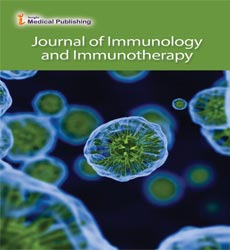Advancements in Immunotherapy
Ethan Fisher*
Editorial office, Journal of Immunology and Immunotherapy, United Kingdom
- *Corresponding Author:
- Ethan Fisher Editorial office, Journal of Immunology and Immunotherapy, United Kingdom E-mail: jmso@emedicinejournals.org
Received Date: August 03, 2021; Accepted Date: August 12, 2021; Published Date: August 24, 2021
Citation: Fisher E (2021) Advancements in Immunotherapy. J Immuno Immnother. Vol.5 No.4:19.
Editorial Note
Immunotherapy refers to the use of exogenous or endogenous immune or non-immune cells to modify the host immune response in order to protect against various illnesses. In 1890, an onco-surgeon named William Coley founded the institution. He created Coley's toxin, which is made up of several types of heat-killed bacteria. Later, he utilized this toxic combination to treat different tumors. However, the lack of underlying molecular processes rendered it less persuasive among scientists when compared to standard cancer therapy. Cytokines (interferons), monoclonal antibodies, check point inhibitors, therapeutic viruses, and adoptive transfers of designed or normal cells were all employed as immunotherapeutic agents. Because of the precise action of immunotherapeutic drugs, it is a very promising therapeutic agent for treating complicated illnesses. However, the cost of these medicines is very costly, which limits their usage in patients. Because of advances in fundamental understanding of cellular processes and enhanced molecular biology tools for genetic modification, the creation of immunotherapeutic drugs has become more cost efficient and has fewer adverse effects. Cancer is a multifactorial illness in which immunity is dysregulated and incapable of eradicating malignant cells expressing a transformed self.
Cancer is a non-infectious illness that affects not just people but other animals, with the exception of naked mole rats, which are known to be cancer resistant. Although malignant cells suppress host immune responses, the host immune system plays an important role in regulating altered cells by generating adequate immune responses through the recruitment of different innate and adaptive immune cells. As a result, one major goal of oncologists among different anticancer therapeutic techniques is to stimulate host specific and nonspecific immunity against malignant cells.
The progress of fundamental knowledge of cellular communication and processes, as well as technical advancements for genetic modification tools and specified cell culture procedures, allows for the manipulation of immune cells such as T cells. The engineered T cell, also known as Chimeric Antigen Receptor T cells (CAR-T cells), is one of the most amazing instances of genetically modified autologous T cells and is used to treat leukemia. CAR-T cells express modified antigen receptors that precisely target tumor antigens produced by tumor cells and destroy them. CAR-T cells are extremely successful against cancers of humoral origin, but their anti-cancer activity against cancers of solid tissue origin has to be investigated further.
Natural Killer (NK) cells are lymphocytic innate immune cells that target changed host cells, malignant cells, and virally infected cells. NK cells directly destroy target cells while leaving healthy cells alone. These characteristics of NK cells make them a viable option for cancer immunotherapy, and researchers all over the globe are seeking to employ autologous NK cells to treat infectious illnesses in immunocompromised individuals during bacterial and viral infections.
Open Access Journals
- Aquaculture & Veterinary Science
- Chemistry & Chemical Sciences
- Clinical Sciences
- Engineering
- General Science
- Genetics & Molecular Biology
- Health Care & Nursing
- Immunology & Microbiology
- Materials Science
- Mathematics & Physics
- Medical Sciences
- Neurology & Psychiatry
- Oncology & Cancer Science
- Pharmaceutical Sciences
